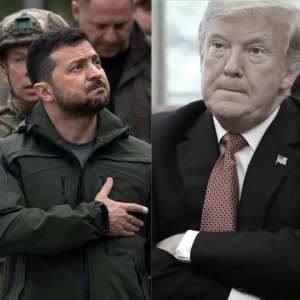
The Russian invasion of Ukraine in February 2022 marked a seismic shift in global geopolitics, one that has since reverberated across economies, security frameworks, and diplomatic alliances. Russia, under Vladimir Putin, has positioned itself as an imperialist aggressor, seeking to subjugate Ukraine in direct violation of international law. Meanwhile, Donald Trump’s recent Oval Office ambush of Ukrainian President Volodymyr Zelensky, alongside Senator J.D. Vance, underscores the growing fracture in Western unity, particularly within the United States. The global response, however, has been swift and resolute, reaffirming Ukraine’s right to sovereignty.
Spinoza’s Lens: The Tyranny of Power
Baruch Spinoza, in his Theological-Political Treatise, warned against the unchecked power of rulers who place self-interest above the collective good:
“The supreme mystery of despotism… is to keep men in a state of deception, and thus to keep them under control.”
Russia’s propaganda machine, weaponizing misinformation to justify its aggression, aligns perfectly with Spinoza’s observation. The Kremlin’s fabricated narratives about “denazifying” Ukraine serve to pacify its domestic audience while rationalizing an unjust war. The true intent, however, remains clear: the suppression of a sovereign nation’s right to self-determination.
The War’s Global Spillover
The consequences of Russia’s invasion extend far beyond Ukraine’s borders. The war has exacerbated global food shortages, energy crises, and inflationary pressures. Ukraine, a major grain exporter, has seen its agricultural output drastically reduced due to Russian blockades, affecting food security in Africa and the Middle East. Meanwhile, Europe has scrambled to reduce its dependence on Russian gas, causing economic strain, particularly in Germany and Eastern Europe.
Auguste Comte, the father of positivism, argued that societies evolve through stages, from theological and metaphysical to scientific and rational structures:
“Demonstrate that order is the basis of progress, and progress the development of order.”
Ukraine embodies this ideal—seeking democratic progress despite the chaos imposed upon it. Russia, conversely, seeks to revert to an archaic order of imperial conquest, rejecting modern principles of self-governance and international cooperation.
Trump’s recent treatment of Zelensky is not just a domestic political misstep; it is a diplomatic scandal that undermines Western unity. By aligning himself with Putin, Trump positions America at odds with its closest allies, all of whom have unequivocally condemned Russia’s aggression. His stance not only emboldens Moscow but also weakens NATO’s deterrence strategy.
The United Nations has repeatedly warned that Russia’s war threatens global stability. UN security analysts emphasize that allowing territorial aggression to go unchecked sets a dangerous precedent for future conflicts:
“The failure to hold aggressors accountable risks a breakdown of international security norms, leading to further unilateral invasions.”
This underscores the urgency of continued Western support for Ukraine—not just for Ukraine’s survival, but for the preservation of global order.
The resounding declarations from European leaders—ranging from France’s Emmanuel Macron to Poland’s Donald Tusk—signal an unyielding commitment to Ukraine. Macron’s statement captures the essence of this unity: “There is an aggressor: Russia. There is a people being aggressed: Ukraine.”
Such clarity is crucial in an era where misinformation clouds judgment. Unlike Trump, European leaders recognize that appeasement is not an option.
While NATO has remained firm in its support for Ukraine, Trump’s stance introduces an element of uncertainty. His potential return to power could undermine NATO’s cohesion, emboldening Russia and jeopardizing security in Eastern Europe. If the U.S. wavers in its commitments, countries like Poland, the Baltics, and Finland may be forced to seek alternative security arrangements.
Sanctions on Russia have significantly disrupted global markets, but they remain necessary. Allowing Moscow to escape economic consequences would legitimize its actions and embolden other authoritarian regimes. The war has tested the resilience of global supply chains, particularly in energy and agriculture, reinforcing the need for economic diversification.
China has carefully navigated the conflict, offering rhetorical support to Russia while maintaining economic ties with the West. However, a Russian victory would set a dangerous precedent for China’s ambitions in Taiwan. The West’s response to Ukraine thus serves as a warning to Beijing: territorial aggression will not go unpunished.
Ukraine’s fight is not just a military struggle; it is a moral one. The war epitomizes the broader struggle between authoritarianism and democracy. As Spinoza noted: “Peace is not mere absence of war, but a virtue that springs from strength of character.”
Ukraine’s resilience embodies this principle. The world must ensure that justice prevails, lest the forces of oppression triumph.
While Western aid has been substantial, it must not falter. Ukraine requires continued military, economic, and diplomatic support to sustain its defense and eventual reconstruction. Any lapse in support would be a betrayal of democratic principles.
Even if Russia were to make territorial gains, its economy and international standing have suffered irreparable damage. Isolation, military attrition, and internal dissent will likely weaken Moscow’s grip in the long run. Putin’s regime may win battles, but it risks losing the war of legitimacy.
Trump’s siding with Putin is not just a political stance—it is a moral failure. The contrast between his position and that of Western leaders underscores a critical choice for the United States: align with democracy or descend into isolationist authoritarianism.
As Croatian Prime Minister Andrej Plenković aptly stated: “Only a just peace can last.”
Ukraine’s struggle is emblematic of the broader fight for global justice. The international community must remain steadfast, ensuring that aggression is met with resistance, not appeasement. The world has learned from history—failure to confront tyranny only invites greater suffering.
The world must remember that the fate of Ukraine is intertwined with the future of international order. As Spinoza warned, deception is the tool of despots, but truth and justice remain the shields of the free. The West must ensure that Ukraine does not stand alone—for if it falls, so too does the very foundation of modern civilization.
BY:
ZAKARI GUA JNR. a.k.a Scorpio 🦂
SECURITY AND JUSTICE ⚖️ ADVOCATE
Email: [email protected]


